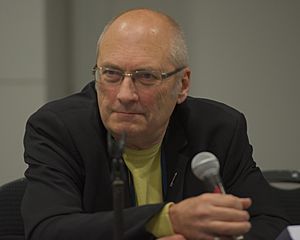John Clute facts for kids
Quick facts for kids
John Clute
|
|
|---|---|
 |
|
| Born | John Frederick Clute 12 September 1940 Canada |
| Occupation | Author, critic, writer |
| Language | English |
| Genre | Non-fiction, novels |
John Frederick Clute (born September 12, 1940) is a Canadian-born author and critic. He is well-known for his work on science fiction and fantasy literature. John Clute has lived in both England and the United States since 1969. Many people describe him as a very important part of science fiction history. They also say he is one of the best critics of science fiction ever. In 1982, he was one of eight people who started the English magazine Interzone.
John Clute has written articles about speculative fiction since the 1960s. He helped edit two very important books: The Encyclopedia of Science Fiction (with Peter Nicholls) and The Encyclopedia of Fantasy (with John Grant). He also wrote The Illustrated Encyclopedia of Science Fiction. All these books won Hugo Awards, which are major awards for science fiction and fantasy works.
In 1994, John Clute received the Pilgrim Award. This award is given for a lifetime of great work in science fiction studies. He has also written several collections of reviews and essays, including Strokes and Look at the Evidence. His novel Appleseed, published in 2001, is a space opera. It was praised for its creative ideas and exciting language. The New York Times even named it a Notable Book in 2002.
In 2006, John Clute released an essay collection called The Darkening Garden: A Short Lexicon of Horror. A new online version of The Encyclopedia of Science Fiction came out in 2011. It was greatly expanded and won another Hugo Award for Best Related Work in 2012. By 2017, John Clute had written most of the articles in the Encyclopedia. He wrote over 6,400 articles by himself and more than 1,200 with others. This added up to over 2.4 million words! He was a special guest at Loncon 3, the 72nd World Science Fiction Convention, in August 2014.
Contents
About John Clute's Life
John Clute grew up in Canada. He lived in the United States from 1956 to 1964. He studied at New York University. In 1964, he married artist Judith Clute. Since 1996, he has been the partner of Elizabeth Hand.
John Clute's Writing Career
John Clute's first professional writing was a long science fiction poem called "Carcajou Lament." It appeared in TriQuarterly in 1959. His first short story, "A Man Must Die," was published in New Worlds in 1966.
In 1960, he worked as an Associate Editor for Collage magazine. During the 1960s and 70s, he wrote many important essays and reviews for NEW WORLDS.
In 1977, John Clute published his first novel, The Disinheriting Party. This story is about a family with many problems. It has a fantasy feel, even though it's not strictly a fantasy novel. Reviewers noted how the story moved quickly and strongly to its end.
His second novel, Appleseed (2001), tells the story of Nathanael Freer. Nathanael pilots a spaceship with an AI helper. He is on his way to deliver special devices to a planet. On his journey, he meets a man named Johnny Appleseed. This meeting helps Nathanael reunite with his lost love. Meanwhile, a dangerous "plaque" is destroying data across the galaxy. John Clute has suggested Appleseed is the first book in a planned series. Science fiction author Paul Di Filippo called it "a space opera for the 21st century."
Reviewing Books and Films
John Clute began writing important science fiction reviews in the late 1960s for New Worlds. He has reviewed many books and non-fiction works for magazines like Interzone, The Magazine of Fantasy & Science Fiction, and The New York Review of Science Fiction. Some of these early writings were collected in his book Strokes.
While he is best known for reviewing books, John Clute has also reviewed films. He is known for his honest and sometimes funny writing style. Some of his review column titles show his direct approach.
The Idea of Honest Reviews
John Clute believes that reviewers of science fiction and fantasy should always be honest. He calls this idea the "Protocol of Excessive Candour." He argues that telling the truth in reviews is more helpful than being too polite, even if it means being harsh. He thinks that honesty helps the genre grow and shows love for the stories and the readers. He believes that truth is very important, and reviewers should use every tool they have to share it.
John Clute's Unique Writing Style
John Clute has described his own writing style as practical, even though it can sometimes be complex. He explained that the connections between his sentences might be hidden a bit deeper, using metaphors. He feels this is how someone might write when a language is new and exciting.
Matthew Davis, a writer, has said that John Clute's writing stands out. This is because of his deep knowledge and his unique style. Even in his more formal works, his writing is easy to recognize. Rich Horton from SF Site agreed, noting that John Clute is known for his sharp mind and wide vocabulary. He uses both to create prose that is not simple but is very precise and exciting to read.
Author Henry Wessells, reviewing The Darkening Garden, noted that John Clute is a master of using many words and repeated metaphors. He uses rich language to share insights that seem both planned and spontaneous. Wessells also pointed out that John Clute has read and understood a huge number of books, and he quotes them accurately.
See also
 In Spanish: John Clute para niños
In Spanish: John Clute para niños
 | Jewel Prestage |
 | Ella Baker |
 | Fannie Lou Hamer |

